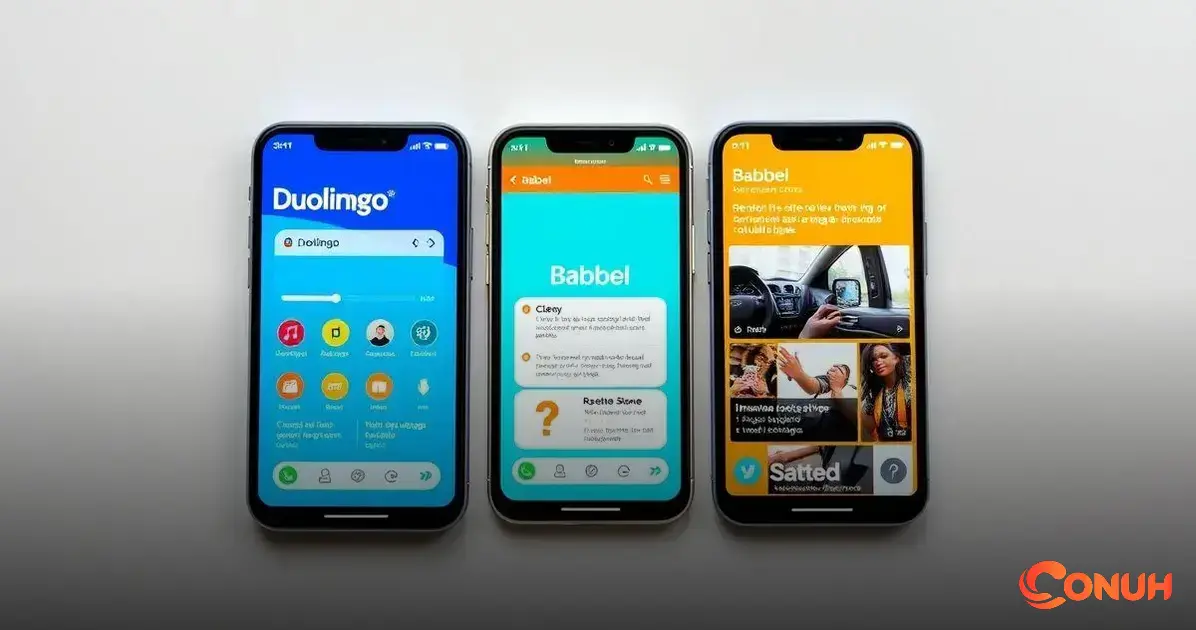ADVERTISEMENT
Language learning apps are transforming the way we acquire new languages today. These innovative tools make learning accessible and engaging for everyone.
Explore the features that can elevate your language journey and make learning a breeze.
ADVERTISEMENT
Keep reading to discover the top apps that will enhance your language learning experience!
Best Language Learning Apps for Beginners
For beginners, selecting the right language learning app can make all the difference. Apps like Duolingo provide a fun and interactive way to learn. They use games and quizzes to help reinforce new words and phrases every day, making learning feel less like a chore.
Another popular choice is Babbel, which focuses on conversation skills. This app offers lessons that mimic real-life dialogues, helping beginners to communicate effectively. With its speech recognition feature, learners can practice their pronunciation and gain confidence.
Lastly, Memrise is an excellent app for vocabulary building. It uses spaced repetition to help users remember words and phrases better. With engaging videos of native speakers, beginners can also get a taste of the culture behind the language they are learning.
Top Features to Look for in Language Apps
When choosing a language learning app, consider the user interface. A clean and simple design makes navigating through lessons easier. Beginners should look for apps that are intuitive, so they spend more time learning and less time figuring out how to use the app.
Another key feature to look for is personalisation. Great language apps tailor their lessons to fit the user’s progress. Look for apps that adapt learning paths based on your strengths and weaknesses, making it easier to focus on areas that need improvement.
Lastly, find an app that offers variety in learning methods. This includes vocabulary games, flashcards, and speaking practice. Apps that incorporate different activities can make learning more enjoyable and enhance retention of new words and phrases.
Comparative Review of Popular Language Apps

When comparing popular language apps, Duolingo stands out for its gamified approach to learning. Users can enjoy fun challenges and earn rewards as they progress. This makes it ideal for beginners who want to learn while having fun.
Babbel is another contender, focusing more on real-life conversation skills. Its lessons are designed by language experts and are great for learners who want to become conversational quickly. Babbel’s subscription model ensures that the content remains fresh and up-to-date.
Lastly, Rosetta Stone offers an immersive experience that features interactive elements. It helps users learn through context, like pictures and spoken words, without translations. This method can be challenging, but it’s effective for those who prefer a deep dive into a new language.
How Language Apps Enhance Vocabulary Skills
Language apps enhance vocabulary skills by using interactive exercises that engage learners. These exercises often include matching words with pictures or completing sentences, which makes it easier to remember new terms. The fun and dynamic nature of the activities keeps users motivated to learn more.
Another effective method is the use of spaced repetition. This technique helps learners revisit words over expanding intervals, reinforcing memory retention. By practising words repeatedly over time, users are less likely to forget what they have learned.
Language apps often include contextual learning, where vocabulary is taught within real-life scenarios. This method allows users to see how words and phrases are used in context. It not only makes learning more relatable but also helps learners apply vocabulary in practical situations.
Using Language Apps to Improve Speaking
Using language apps to improve speaking skills can be very effective. Many apps offer voice recognition technology that listens to users as they speak. This feature helps identify pronunciation mistakes, allowing learners to correct their speech and sound more natural.
Another way these apps enhance speaking is through conversation practice. Some apps connect users with native speakers or chatbots. This real-time practice helps build confidence and enables learners to apply vocabulary in practical conversations.
Furthermore, apps often provide speaking challenges that encourage users to record their voices. By listening to their recordings, learners can track their progress and notice areas for improvement. These activities make speaking practice engaging and help users become more fluent over time.
Creating a Study Plan with Language Apps

Creating a study plan with language apps is essential for staying organised. Start by setting clear goals for what you want to achieve. Whether it’s learning new vocabulary or becoming fluent in conversation, having specific aims keeps you focused and motivated.
Next, allocate time slots in your daily or weekly schedule for studying. Pick times when you feel most alert and can concentrate. Using language apps regularly, even if it’s just for 15 minutes a day, helps reinforce learning and maintain a steady pace.
Additionally, mix different activities in your study plan. Include listening, speaking, and writing exercises to keep things interesting. Most language apps offer a variety of exercises, so use them to create a balanced routine. This way, you’ll develop a well-rounded skill set in your target language.
User Experiences with Learning Apps
User experiences with learning apps can vary widely, but many users find them to be very helpful. For example, some learners appreciate the flexibility that apps offer. They can study at their own pace and access lessons anytime, which fits into busy schedules.
Another common experience is the engaging content found in these apps. Users enjoy interactive games and challenges that make learning fun. This gamified approach keeps users motivated and encourages regular practice, which is key to language learning.
However, not all experiences are positive. Some users mention feeling overwhelmed by the amount of information or by advanced content. To address this, many apps allow users to choose their skill level, ensuring that everyone can find materials suited to their needs.
Language learning apps have changed how people learn new languages today. Many users find that they can learn at their own pace, making it a popular choice for busy individuals. Whether studying on a commute or at home, these apps provide convenient access to lessons whenever needed.
One important feature users love is the interactive elements these apps include. Games, quizzes, and speaking exercises make learning engaging and enjoyable. This fun approach can motivate learners to keep coming back and practising daily, which is key to progress.
Moreover, many language apps track user progress, providing feedback on areas that need improvement. This helps learners stay accountable and feel a sense of achievement. Not only can they see how far they’ve come, but they can also set new goals to continue their language journey.







